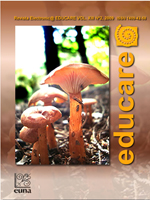La población estudiantil en el sétimo año de la educación pública costarricense
DOI:
https://doi.org/10.15359/ree.13-2.9Keywords:
students, attendance, promotion, seventh grade, secondary level, teachers profileAbstract
Seventh grade students share personal characteristics that are analyzed in this paper based on the teachers´ performance of the proper mediation for the students´ learning. The results of an investigation done with the model of teachers´ profiles at this level will be the basis for this paper (Alfaro et al, 2008a).
We conclude that the biopsychosocial development and maturational stage of the transit-preteen-teen children must be the domain of faculty at this level, as well as, the socioeconomic context of family and social contexts of their students.
References
Alfaro, M.; Brenes, A.; Gamboa, A.; Jiménez, S.; Martín, J.; Ramírez, A.; Vargas M. & Zúñiga, A.
(2008a). Construcción del perfil de desempeño docente para el sétimo año de la educación
pública. Informe de Investigación. Heredia, Costa Rica. Publicación sin sello editorial para el
Centro de Investigación y Docencia en Educación de la Universidad Nacional.
Alfaro, M.; Gamboa, A.; Jiménez, S.; Martín, J.; Ramírez, A. & Vargas, M. (2008b). Construcción
del perfil profesional docente de sétimo año: respuesta a una necesidad actual. Revista
Educare, 12 (2), 32-45.
Alfaro, M.; Gamboa, A.; Jiménez, S.; Martín, J.; Ramírez, A. & Vargas, M. (2009). Diversidad estudiantil
en el sétimo año de la educación secundaria pública costarricense. Revista Educare,
(1), 27-39.
Castro, M.; Díaz, M.; Fonseca, H.; León, A.T.; Moraga, L.; Ruíz, S. & Umaña, W. (2007) Factores
de éxito en la transición a sétimo año. (Informe Final de investigación del Proyecto Perfiles,
dinámicas y desafíos de la educación costarricense, Etapa II): Heredia, Costa Rica: Centro
de Investigación y Docencia en Educación, Universidad Nacional.
García, F. Portillo, J. Romo, J. & Benito, M. (2007). “Nativos digitales y modelos de aprendizaje”.
Actas IV Simposio Pluridisciplinar sobre Diseño, Evaluación, y Desarrollo de Contenidos
Educativos Reutilizables, Bilbao. Recuperado el 25 de enero de 2008, de http://spdece07.ehu.
es/actas/Garcia.pdf
Gastón, A. (1996). Interacción social y desarrollo. En Lecturas sobre el desarrollo de la inteligencia
y del pensamiento. Serie de Publicaciones Nº 1. San José, Costa Rica: Publicaciones del
SIMED.
Gavilán, M. & D’Onofrio, S. (2003). Re-pensar al adolescente de hoy y re-crear la escuela.
Recuperado el 5 de abril de 2008, de http://www.educared.org.ar/vicaria/adjuntos/tema-mes/
Conf-Adolescencia.pdf
Guevara, R. (2004). Material fotocopiado del Departamento de Orientación y Vida Estudiantil.
Ministerio de Educación Pública de Costa Rica.
Guitar, R. (2002). Las actitudes en el centro escolar. Reflexiones y propuestas. Barcelona, España:
Editorial GRAÓ.
Labarrere, A. (2008). Bases conceptuales de la mediación y su importancia actual en la práctica
pedagógica. Summa Psicológica UST, Vol. 5, Nº 2, 87-96.
Monereo, C., Castelló, M., Clariana, M., Palma, M. & Pérez, M. (1997). Estrategias de enseñanza y
aprendizaje: formación del profesorado y aplicación en la escuela (4ª
ed). Barcelona, España:
Editorial GRAÓ.
Obiols, G. & Di Segni, S. (1995). Adolescencia, Posmodernidad y Escuela Secundaria. La crisis
de la enseñanza media. Buenos Aires, Argentina: Kapelusz Editora.
Pacheco, X. & D’Antoni, M. (2003). ¿Por qué?: Jóvenes ante el desorden mundial. Heredia, Costa
Rica: Educología, Universidad Nacional.
Paquay, L., Altet, M., Charlier, E. & Perrenoud, P. (2005). La formación profesional del maestro.
México D. F.: Fondo de Cultura Económica.
Prensky, M. (2001). Digital Natives Digital Immigrants. Recuperado el 5 de abril de 2008, de:
http://www.marcprensky.com/writing/Prensky%20%20Digital%20Natives,%20Digital%20
Immigrants%20-%20Part1.pdf
Rojas, Y. (2007). La formación de educadores desde la propuesta del CONARE: Hacia un modelo
educativo para mejorar la calidad de la educación costarricense. Congreso Pedagógico
Nacional: Formación profesional del educador y la educadora costarricenses. San José, Costa
Rica: Autor.
Torres, R. (2006). Los nuevos paradigmas en la actual revolución científica y tecnológica. San
José, Costa Rica: EUNED.
Downloads
Published
How to Cite
Issue
Section
License
1. In case the submitted paper is accepted for publication, the author(s) FREELY, COSTLESS, EXCLUSIVELY AND FOR AN INDEFINITE TERM transfer copyrights and patrimonial rights to Universidad Nacional (UNA, Costa Rica). For more details check the Originality Statement and Copyright Transfer Agreement
2. REUTILIZATION RIGHTS: UNA authorizes authors to use, for any purpose (among them selfarchiving or autoarchiving) and to publish in the Internet in any electronic site, the paper´'s final version, both approved and published (post print), as long as it is done with a non commercial purpose, does not generate derivates without previous consentment and recognizes both publisher's name and authorship.
3. The submission and possible publication of the paper in the Educare Electronic Journal is ruled by the Journal’s editorial policies, the institutional rules of Universidad Nacional and the laws of the Republic of Costa Rica. Additionally, any possible difference of opinion or future dispute shall be settled in accordance with the mechanisms of Alternative Dispute Resolution and the Costa Rican Jurisdiction.
4. In all cases, it is understood that the opinions issued are those of the authors and do not necessarily reflect the position and opinion of Educare, CIDE or Universidad Nacional, Costa Rica. It is also understood that, in the exercise of academic freedom, the authors have carried out a rogorous scientific-academic process of research, reflection and argumentation thar lays within the thematic scope of interest of the Journal.
5. The papers published by Educare Electronic Journal use a Creative Commons License:















 The articles published by Educare Electronic Journal can be shared with a Creative Commons License:
The articles published by Educare Electronic Journal can be shared with a Creative Commons License: 



